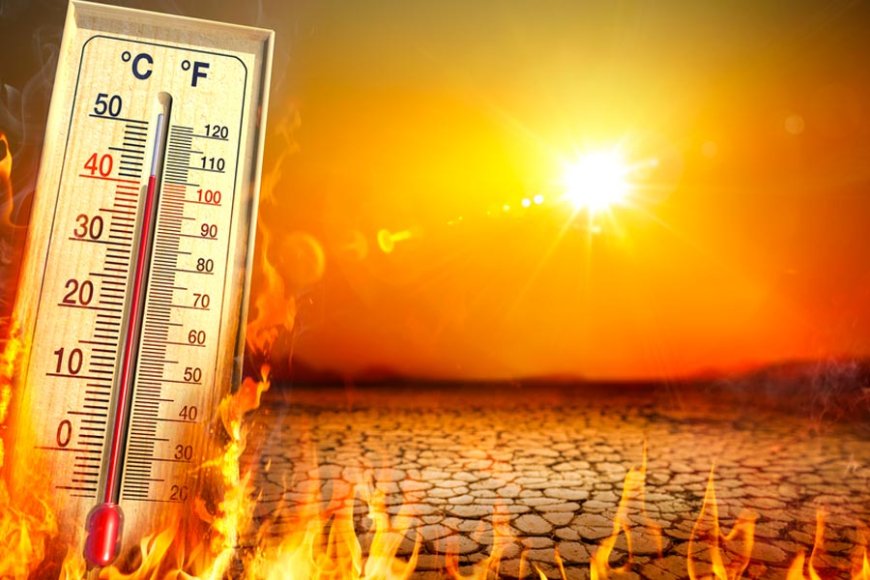Karachi Heatwave Expected from April 20: PMD
The Pakistan Meteorological Department (PMD) has officially warned that Karachi is expected to experience a severe heatwave starting from April 20, 2025. As per the latest weather advisories.

The Pakistan Meteorological Department (PMD) has officially warned that Karachi is expected to experience a severe heatwave starting from April 20, 2025. As per the latest weather advisories, temperatures may soar above 42°C (107.6°F), prompting health and safety concerns for the city’s nearly 20 million residents.
-
PMD forecasts an intense heatwave in Karachi starting April 20
-
Temperatures are expected to cross 42°C
-
Heatwave may persist for 3 to 5 days
-
Citizens advised to avoid direct sun exposure, stay hydrated
-
Risk of heatstroke, especially for children, the elderly, and outdoor workers
-
Government agencies are on alert for possible health emergencies.
According to PMD officials, the upcoming heatwave is caused by shifting wind patterns and high-pressure systems that prevent the formation of cooling sea breezes from the Arabian Sea.
What Is Causing This Heatwave?
-
High-pressure system over the Sindh region
-
Absence of sea breeze, especially during the daytime
-
Delayed western disturbances, which typically bring mild weather
-
Global climate change is contributing to more frequent heat events
“The upcoming weather system will create dry and extremely hot conditions in Karachi and other coastal areas. People should remain indoors during peak hours and avoid unnecessary exposure.”
With many students attending school and workers performing duties outdoors, both government and private institutions have been urged to take precautionary measures.
Government Recommendations:
-
Schools should reduce outdoor assemblies or sports activities
-
Employers must ensure water and rest breaks for field workers
-
Construction and sanitation departments advised to reschedule shifts
A senior health department official added:
“We’re coordinating with hospitals to stay on high alert. Emergency response units are being mobilized in advance.”

-
Emergency hotlines activated for public queries
-
Public Service Messages (PSMs) are being broadcast on TV, radio, and social media
-
Water tankers and mobile clinics are deployed in low-income areas
-
Karachi Metropolitan Corporation (KMC) has been ordered to:
-
Set up heat shelters
-
Keep ambulances on standby
-
Provide ice and cold water in public parks and bus stands
-
Karachi has experienced several severe heat waves in recent years, the most devastating being in June 2015, when over 1,200 people lost their lives due to heatstroke and related complications.
-
2015: 1,200+ deaths due to heatstroke
-
2018: Temperatures hit 44°C in late May
-
2021: Heat index reached 50°C in parts of Karachi
This year’s heatwave, though not as prolonged, poses similar risks if precautions aren’t taken seriously.
The PMD and Sindh Health Department have launched a joint #BeatTheHeat campaign aimed at educating the public through:
-
SMS alerts and robocalls
-
Flyers were distributed in markets and mosques
-
Facebook, Instagram, and Twitter posts with tips
-
Radio spots and community announcements
Local influencers and social workers are being urged to spread the word and assist the vulnerable.
Experts agree that climate change is increasing the frequency and severity of heat waves in Pakistan’s urban centers. Karachi, with its concrete landscape and limited greenery, is especially at risk.
Long-Term Solutions:
-
Increase urban tree plantations
-
Encourage green rooftops and shaded spaces
-
Invest in early warning systems
-
Improve access to clean water in low-income areas
-
Educate communities about climate resilience
With the PMD's heatwave warning for Karachi from April 20, residents, officials, and institutions must stay alert, take proactive steps, and work together to prevent heat-related tragedies.
Staying informed and prepared could be the key to saving lives during this upcoming weather challenge.

 Ateeq Ur Rehman
Ateeq Ur Rehman